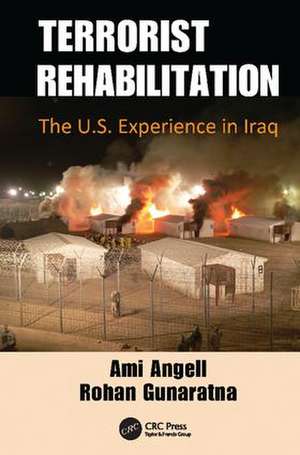Terrorist Rehabilitation: The U.S. Experience in Iraq
Autor Ami Angell, Rohan Gunaratnaen Limba Engleză Paperback – 13 iun 2017
Custodial and community rehabilitation of terrorists and extremists is a new frontier in the fight against terrorism. This forward-thinking volume:
- Highlights the success of a rehabilitation program curriculum in Iraq
- Encourages individuals and governments to embrace rehabilitation as the next most logical step in fighting terrorism
- Examines the recent history of threat groups in Iraq
- Demonstrates where the U.S. went awry in its war effort, and the steps it took to correct the situation
- Describes religious, vocational training, education, creative expression, and Tanweer programs introduced to the detainee population
- Provides insight into future steps based on lessons learned from current rehabilitation programs
Preț: 338.33 lei
Preț vechi: 394.37 lei
-14% Nou
Puncte Express: 507
Preț estimativ în valută:
64.74€ • 67.76$ • 53.88£
64.74€ • 67.76$ • 53.88£
Carte tipărită la comandă
Livrare economică 31 martie-14 aprilie
Preluare comenzi: 021 569.72.76
Specificații
ISBN-13: 9781138112438
ISBN-10: 1138112437
Pagini: 454
Ilustrații: 131
Dimensiuni: 156 x 234 x 31 mm
Greutate: 0.45 kg
Ediția:1
Editura: Taylor & Francis
Colecția CRC Press
Locul publicării:Oxford, United Kingdom
ISBN-10: 1138112437
Pagini: 454
Ilustrații: 131
Dimensiuni: 156 x 234 x 31 mm
Greutate: 0.45 kg
Ediția:1
Editura: Taylor & Francis
Colecția CRC Press
Locul publicării:Oxford, United Kingdom
Public țintă
Academic and Professional Practice & DevelopmentCuprins
A Recent History of Iraq. State of Affairs of Detainment and Detainees. Setting the Stage for Terrorist Rehabilitation. In(To) the Fire. Part of the Team. Detainee Care and Custody. A Method to the Madness. The Secret Weapon. Religious Enlightenment. Teach a Person to Fish. Art of War. Widening the Scope. The Future of Extremist Rehabilitation Programs. Strategy for an Unconquerable Nation. References. Appendix A. Appendix B. Index.
Notă biografică
Ami Angell, PhD, LLM, is a research fellow at the International Centre for Political Violence and Terrorism Research at the S. Rajaratnam School of International Studies at Nanyang Technological University in Singapore. She has spent a substantial amount of time working in the Middle East, including 44 months in Iraq (2005–2008) and 24 months in the Occupied Palestinian Territories and Israel. She also has worked and lived in Lebanon, Jordan, Qatar, Italy, Switzerland, England and, most recently, Singapore.
Rohan Gunaratna, PhD, is a specialist of the global threat environment, with expertise in threat groups in Asia, the Middle East, and Africa. He is head of Singapore’s International Centre for Political Violence and Terrorism Research (ICPVTR), one of the largest specialist counter terrorism research and training centers in the world. He is also a professor of Security Studies at the S. Rajaratnam School of International Studies, Nanyang Technological University, Singapore.
Rohan Gunaratna, PhD, is a specialist of the global threat environment, with expertise in threat groups in Asia, the Middle East, and Africa. He is head of Singapore’s International Centre for Political Violence and Terrorism Research (ICPVTR), one of the largest specialist counter terrorism research and training centers in the world. He is also a professor of Security Studies at the S. Rajaratnam School of International Studies, Nanyang Technological University, Singapore.
Descriere
Because terrorists are made, not born, it is critically important to world peace that detainees and inmates influenced by violent ideology are deradicalized and rehabilitated back into society. This volume demonstrates through the actual experiences of military personnel, defense contractors, and Iraqi nationals that deradicalization and rehabilitation programs can succeed and positively impact thousands of would-be terrorists globally if utilized to their full capacity. The book describes religious, vocational training, education, creative expression, and Tanweer programs introduced to the detainee population. It also offers insight into future steps based on lessons learned from current rehabilitation programs.
